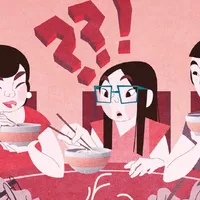5. 六月 十六日 星期四 晴天 ( Thursday, June 16, Sunny day)
|ngày 16|||thứ Năm|||
June|the 16th|Thursday|Sunny day|Thursday|||
|||solig dag||||
5. donnerstag, 16. Juni, Sonniger Tag
5. Thursday, June 16, Sunny day
5. Jueves 16 de junio, día soleado
5. jeudi 16 juin, journée ensoleillée
5.6月16日(木)晴れ
5. czwartek, 16 czerwca, słoneczny dzień
5. quinta-feira, 16 de junho, dia de sol
5. четверг, 16 июня, солнечный день
5. 六月十六日 星期四 晴天 ( Thursday, June 16, Sunny day)
今天 晚上 我 吃晚饭 的 时候 , 我 注意 到 了 一件 很 有意思 的 事情 。
|tonight||dinner||when|I|noticed|||a thing||interesting||thing
Heute Abend, als ich mein Abendessen aß, bemerkte ich etwas sehr Interessantes.
This evening, while I was eating dinner, I noticed something very interesting.
Esta noche, mientras cenaba, me he dado cuenta de algo muy interesante.
Ce soir, alors que je dînais, j'ai remarqué quelque chose de très intéressant.
Esta noite, quando estava a jantar, reparei numa coisa muito interessante.
Сегодня вечером, когда я ужинал, я заметил кое-что очень интересное.
当 爷爷奶奶 吃 面条 的 时候 , 他们 发出 了 很大 的 声音 。
when|grandparents|were eating|noodles||||emitted||very loud||sound
|||nudlar||||gjorde||||
Als die Großeltern die Nudeln aßen, machten sie viel Lärm.
When the grandparents ate the noodles, they made a lot of noise.
Cuando los abuelos se comieron los fideos, hicieron mucho ruido.
Lorsque les grands-parents ont mangé les nouilles, ils ont fait beaucoup de bruit.
Quando os avós comeram a massa, fizeram muito barulho.
Когда бабушка и дедушка ели лапшу, они сильно шумели.
在 意大利 吃 面条 的 时候 我们 不 发出声音 。
|Italy||pasta||when|||make noise
Wenn wir in Italien Pasta essen, geben wir keinen Laut von uns.
When we eat pasta in Italy, we don't make a sound.
Cuando comemos pasta en Italia, no hacemos ruido.
Lorsque nous mangeons des pâtes en Italie, nous ne faisons pas de bruit.
Quando comemos massa em Itália, não fazemos barulho.
Когда мы едим пасту в Италии, мы не издаем ни звука.
我 问 爷爷奶奶 :“ 为什么 你们 吃 面条 的 时候 发出声音 呢 ?”
||grandparents||||noodles|||make a sound|
Ich fragte meine Großeltern: "Warum macht ihr ein Geräusch, wenn ihr Nudeln esst?"
I asked my grandparents: "Why do you make noise when you eat noodles?"
Pregunté a mis abuelos: "¿Por qué hacéis ruido cuando coméis fideos?".
J'ai demandé à mes grands-parents : "Pourquoi faites-vous du bruit quand vous mangez des nouilles ?"
Perguntei aos meus avós: "Porque é que fazem barulho quando comem massa?"
Я спросил у бабушки и дедушки: "Почему вы шумите, когда едите лапшу?"
爷爷 笑 着 说 :“ 吃 面条 的 时候 发出 声 音 , 意思 是 你 觉得 面条 很 好吃 。”
|||||||||||||||noodles||
Großvater lachte und sagte: "Wenn du die Nudeln isst, mach ein Geräusch, das bedeutet, dass du die Nudeln lecker findest.
Grandpa laughed and said, "When you eat the noodles, make a sound, it means you think the noodles are good.
El abuelo se rió y dijo: "Cuando comas los fideos, haz un sonido, significa que piensas que los fideos están deliciosos.
Grand-père rit et dit : "Quand tu manges les nouilles, fais un bruit, cela veut dire que tu penses que les nouilles sont délicieuses.
O avô riu-se e disse: "Quando comeres a massa, faz um som, significa que achas que a massa está deliciosa.
Дедушка рассмеялся и сказал: "Когда ты ешь лапшу, издавай звук, это значит, что ты думаешь, что лапша вкусная.
爸爸 马上 说 :“ 中国 文化 跟 意大利 文化 不 一样 。
Dad|immediately|said|China|culture|with|Italy|culture|not|the same
|||||||||samma
Papa sagte sofort: "Die chinesische Kultur ist anders als die italienische Kultur.
Dad immediately said, "Chinese culture is different from Italian culture.
Papá dijo inmediatamente: "La cultura china es diferente de la italiana.
Papa a immédiatement répondu : "La culture chinoise est différente de la culture italienne.
O meu pai disse imediatamente: "A cultura chinesa é diferente da cultura italiana.
Папа сразу же сказал: "Китайская культура отличается от итальянской.
在 意大利 , 吃 面条 的 时候 发出 声 音 代表 不礼貌 , 但是 如果 你 去 中国 , 日本 旅游 , 吃 面条 的 时候 发出声音 代表 面条 很 好吃 。
|Italy||noodles||when|making noise|sound|sound|represents|impolite||if|||China|Japan|travel||noodles||when|slurping|represents|noodles|very|delicious
|||||||||betyder|oartigt||||||||||||||||
In Italien gilt es als unhöflich, beim Nudelessen ein Geräusch zu machen, aber wenn man nach China oder Japan reist, bedeutet ein Geräusch beim Nudelessen, dass die Nudeln gut sind.
In Italy, to make a sound when you eat a noodle means it's rude, but if you travel to China, Japan, to make a sound when you eat a noodle means it's good.
En Italia, hacer ruido al comer fideos es de mala educación, pero si viajas a China o Japón, hacer ruido al comer fideos significa que están buenos.
En Italie, faire du bruit en mangeant des nouilles signifie que c'est impoli, mais si vous voyagez en Chine ou au Japon, faire du bruit en mangeant des nouilles signifie qu'elles sont bonnes.
Em Itália, fazer barulho quando se come massa significa que é indelicado, mas se viajarmos para a China ou para o Japão, fazer barulho quando se come massa significa que esta é boa.
В Италии шуметь, когда ешь лапшу, значит быть невежливым, но если вы отправитесь в Китай или Японию, то шуметь, когда ешь лапшу, значит, она вкусная.

